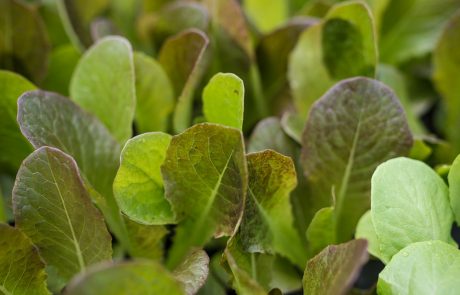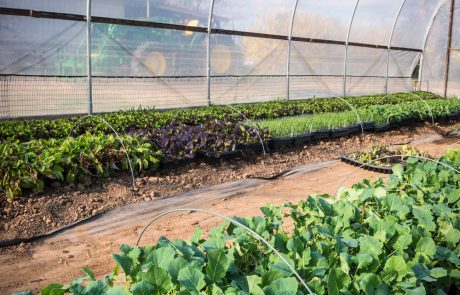
By Sarah Fulton
With celebrity athletes from Tom Brady to Serena Williams adopting plant-based diets and farmers’ markets cropping up in many towns across the Lehigh Valley, it’s hard to ignore the cry to eat fresh, local produce for health benefits. And now, with greater variety of produce, from hybrids to heirlooms, becoming more available, there is no better tasting time to load your plate with vegetables.
“We grow a lot of variety of crops,” says farmer Lynn Trizna. “It’s a balance of good, flavorful staples and the weird stuff. We encourage people to try new things.”
Trizna works for Rodale Institute, the birthplace of the organic movement in America, and is the farm manager of the St. Luke’s Rodale Institute Organic Farm, a partnership between the health care network and the organic non-profit.
“With our organic farm, we choose crops with different flavors,” Trizna says.
The farm grows the summertime staples of tomatoes and peppers, but more unusual types, such as yellow golden pear tomatoes and long, thin Asian peppers, and all of it organically.
Organic farming aims to enhance the health of the soil by planting beneficial cover crops and eschewing chemicals, which results in greater resiliency in the face of extreme weather or pest infestation, Trizna explains. The 11.5 acres farmed at Anderson Campus supplies patients and employees within the St. Luke’s University Health Network with fresh produce spring to fall.
Patients at St. Luke’s hospitals will eat the organic veggies in their hospital meals and network employees who have signed up for Community Supported Agriculture share will take home a fresh box of in-season produce each week.
Members might find purple kohlrabi, fennel with its licorice-like flavor, and purplish-red raddichio for a summer salad.
“They can’t pronounce some of it, but we get a lot of positive feedback,” Trizna says.
The ethic of the farm reflects much of the nutritional education St. Luke’s University Health Network offers its patients. Dagny Danga-Storm, RD, teaches diabetics how to adopt a Mediterranean diet to help control weight, blood pressure, blood sugar, and increase fiber intake.
“Americans tend to eat way too much of the bad fats through junk food and fast food restaurants,” Danga-Storm says.
Danga-Storm says the benefits of a whole foods, plant-based diet are lower heart disease incidence, healthy blood pressure and blood sugar levels, lower cholesterol, better weight control, and even the prevention of certain cancers.
Diets high in meat consumption can lead to obesity, heart disease, and diabetes, Danga-Storm says. Andrew Goodbred, MD of St. Luke’s Family Medicine in Easton agrees.
“We know a plant-based diet provides nutrients for performance and recovery as opposed to more animal-based. We view it as a life-extending approach to nutrition,” Dr. Goodbred says.
These diets generate more blood flow to the muscles, provides antioxidants, and reduces inflammation. It is effective in disease prevention and treatment.
Dr. Goodbred notes the Tennessee Titans offensive line has adopted a plant-based diet and players have reported improved physical recovery time.
Dr. Goodbred is heading up the residency training program at St. Luke’s Family Medicine in Easton and he plans to incorporate plant-based diet and nutrition education into training.
“We’ll teach the next generation of physicians nutrition, exercise, and how to prescribe,” he says.
Dr. Goodbred applauds the farm at the Anderson Campus.
“We’re not just paying lip service to the things that relate to lifestyle, we actually incorporate it into the everyday experience.”
Dr. Goodbred says studies have shown that organic eaters have fewer chemicals in their bloodstream than those who eat conventional food, but the research has yet to link that to any longterm effects.
Danga-Storm tells patients to aim for 7 to 9 servings of fruit and veggies a day. That could be an apple, a pear, a peach, a small banana, and two cups of salad, broccoli, or carrots. She says patients can have unlimited leafy greens. She recommends 6 to 7 servings of carbohydrates a day, in whole food form, such as rice or a baked potato. She says animal protein is best consumed sparingly, mixed into a dish or as a condiment, not as the star of the show.
She urges patients to shop at local farmers’ markets and be adventurous adding new foods to their diets.
“There’s nothing like a farm fresh tomato or peach in season,” Danga-Storm says.
As a farmer, Trizna wholeheartedly agrees. She eats only in season, so that first summer tomato, months in the making, is a blissful experience of pure gratitude, with just a little dash of salt. She advocates eating seasonally and locally, so food can be consumed at the peak of ripeness and impart the most nutrients.
“Treat your body with amazing, delicious food.”
Lehigh Valley residents have many opportunities to eat seasonally. The region is home to 14 producer-only farmers’ markets. That means the items were grown or made by the people selling them, such as jams, breads, and pastured meats.
BUY FRESH BUY LOCAL
A complete list is available from Buy Fresh Buy Local Greater Lehigh Valley, a non-profit organization, that promotes the markets and works to build local food economy at buylocalglv.org/resources/producer-only-farmers-market-map/.
As seen in the Summer/Fall 2019 Issue
Click to Visit Our Advertisers







